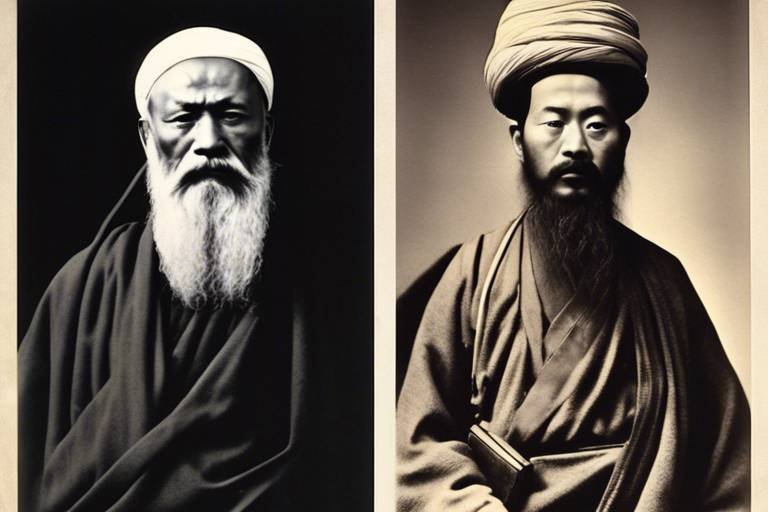An Overview of Feminist Philosophy
Feminist philosophy is an expansive and dynamic field that seeks to understand and critique the ways in which gender influences our lives, our societies, and our understanding of knowledge itself. At its core, this branch of philosophy challenges traditional paradigms that have historically marginalized women's voices and experiences. It is not merely an academic pursuit; rather, it is a movement that intersects with various social and political issues, aiming to dismantle systemic inequalities and promote justice.
The significance of feminist philosophy extends beyond the realm of theoretical discourse. It plays a vital role in shaping contemporary thought and social movements, addressing urgent issues such as gender-based violence, reproductive rights, and workplace equality. Feminist philosophers argue that understanding the complexities of gender is crucial for fostering a more equitable society. They ask profound questions: How do societal norms shape our identities? What does it mean to be a woman in a patriarchal society? By engaging with these inquiries, feminist philosophy not only critiques existing structures but also offers pathways for social transformation.
The historical development of feminist philosophy is rich and varied, rooted in the struggles of early suffragists and evolving through the contributions of numerous influential thinkers. From the writings of Mary Wollstonecraft in the 18th century to the contemporary debates surrounding intersectionality, feminist philosophy has continuously adapted to address the changing landscapes of gender relations. It is essential to recognize this evolution, as it provides context for understanding current feminist theories and practices.
As we delve deeper into the key concepts of feminist philosophy, we will explore fundamental ideas such as gender, oppression, and intersectionality. These concepts serve as the backbone of feminist discourse, enabling a nuanced critique of societal norms and power dynamics. Feminist philosophy is not monolithic; it encompasses a diverse range of perspectives and methodologies, reflecting the varied experiences of women across different cultures and contexts.
In summary, feminist philosophy is a vital area of inquiry that challenges traditional notions of knowledge, identity, and power. It invites us to reconsider our assumptions about gender and its implications for our lives and societies. By engaging with feminist thought, we can foster a deeper understanding of the complexities of gender and contribute to the ongoing struggle for equality and justice.
- What is feminist philosophy? Feminist philosophy is a branch of philosophy that examines issues related to gender, oppression, and the social construction of identity, aiming to promote equality and justice.
- Who are some influential feminist philosophers? Notable figures include Simone de Beauvoir, Judith Butler, and bell hooks, each contributing significantly to feminist thought.
- Why is intersectionality important in feminist philosophy? Intersectionality highlights how overlapping identities, such as race, class, and gender, affect experiences of oppression and privilege, emphasizing the diversity within feminist discourse.

The Historical Context of Feminist Philosophy
Understanding the historical backdrop of feminist philosophy is crucial in appreciating its evolution and significance. Feminist thought did not emerge in a vacuum; rather, it has deep roots that can be traced back to various social movements and philosophical inquiries. From the early suffragists who fought for women's right to vote in the 19th century to the modern theorists who challenge contemporary social norms, feminist philosophy has continually evolved, reflecting the changing dynamics of society.
In the 18th and 19th centuries, the groundwork for feminist philosophy was laid by thinkers such as Mary Wollstonecraft, whose groundbreaking work, A Vindication of the Rights of Woman, argued for women's education and rationality. This period marked the beginning of a collective consciousness among women regarding their rights and roles in society. The suffragist movement, which gained momentum in the late 19th century, was pivotal in advocating for women's political rights and laid the foundation for future feminist discourse.
The early 20th century saw the emergence of various strands of feminist thought, influenced by the social upheavals of the time, including the World Wars and the Great Depression. Women began to enter the workforce in unprecedented numbers, challenging traditional gender roles. This shift prompted philosophers to question the very nature of gender and identity. The post-World War II era, however, brought about a backlash against women’s rights, leading to a period of retrenchment that feminists would later critique.
It wasn't until the 1960s and 1970s that feminist philosophy began to gain significant traction in academic circles. The second wave of feminism emerged, focusing on issues such as reproductive rights, workplace equality, and sexual liberation. This era introduced influential texts like Betty Friedan's The Feminine Mystique, which critiqued the domestic role assigned to women and sparked widespread debate. During this time, feminist philosophers began to articulate the importance of women's experiences as a valid source of knowledge, laying the groundwork for what would later be termed feminist epistemology.
As feminist philosophy continued to evolve, it began to embrace a wider array of perspectives. The concept of intersectionality, introduced by scholars like Kimberlé Crenshaw in the late 1980s, emphasized the interconnected nature of social categorizations such as race, class, and gender. This framework highlighted the fact that experiences of oppression are not uniform and that they vary significantly based on an individual's multiple identities. Feminist philosophy thus became a rich tapestry of ideas, incorporating diverse voices and experiences.
Today, feminist philosophy is not just a response to historical injustices; it is an active participant in contemporary debates surrounding gender, identity, and power structures. It challenges the status quo and pushes for a more inclusive understanding of knowledge and experience. As we delve deeper into this fascinating field, we can appreciate the historical context that has shaped its development and recognize the ongoing relevance of feminist thought in addressing modern societal issues.
- What is feminist philosophy? - Feminist philosophy is a branch of philosophy that examines the ways in which gender influences our understanding of knowledge, reality, and existence. It critiques traditional philosophical frameworks that have historically marginalized women's voices.
- Who are some key figures in feminist philosophy? - Notable figures include Simone de Beauvoir, Judith Butler, and bell hooks, among others, each contributing unique perspectives and theories that have shaped the field.
- How does intersectionality relate to feminist philosophy? - Intersectionality is a critical concept within feminist philosophy that explores how various forms of social stratification, such as race, class, and gender, overlap and affect individuals' experiences of oppression.

Key Concepts in Feminist Philosophy
Feminist philosophy is a vibrant and dynamic field that encompasses a variety of concepts essential to understanding the complexities of gender and social justice. At its core, feminist philosophy interrogates the structures of power and oppression that shape our lives, offering a lens through which we can analyze the world around us. Central to this discourse are key concepts such as gender, oppression, and intersectionality. Each of these ideas provides a framework for examining the multifaceted nature of identity and social dynamics.
One of the most significant concepts in feminist philosophy is gender. Feminist theorists argue that gender is not merely a biological fact but a complex social construct that influences our identities, behaviors, and societal roles. This perspective challenges traditional notions of masculinity and femininity, suggesting that they are not inherent traits but rather roles shaped by cultural expectations. Understanding gender as a social construct opens up a dialogue about how these roles can be deconstructed and redefined, allowing for a more inclusive understanding of identity.
Another critical concept is oppression. Feminist philosophers explore how systemic inequalities affect individuals based on their gender, race, class, and sexuality. Oppression is often manifested in various forms, including economic, political, and social disenfranchisement. By analyzing these structures, feminist philosophy seeks to illuminate the experiences of marginalized groups and advocate for their rights. This analysis is not just theoretical; it has practical implications for activism and social change, as it encourages individuals to recognize and challenge oppressive systems in their own lives.
Furthermore, the idea of intersectionality has become a cornerstone of feminist thought. Coined by scholar Kimberlé Crenshaw, intersectionality examines how overlapping identities—such as race, gender, sexuality, and class—interact to create unique experiences of oppression and privilege. This framework emphasizes that feminism cannot be a one-size-fits-all approach; instead, it must consider the diverse realities faced by individuals. For instance, the struggles of a Black woman cannot be fully understood by looking solely at gender or race in isolation. Intersectionality encourages a nuanced understanding of social dynamics and fosters solidarity among various social movements.
In summary, the key concepts of gender, oppression, and intersectionality in feminist philosophy are not just academic ideas; they are vital tools for understanding and navigating the complexities of modern life. By engaging with these concepts, we can begin to challenge the status quo and work towards a more equitable society.
- What is feminist philosophy? Feminist philosophy is a branch of philosophy that examines the ways in which gender influences our understanding of knowledge, reality, and ethics.
- Why is intersectionality important? Intersectionality is crucial because it highlights how various forms of identity and oppression intersect, leading to unique experiences that must be acknowledged in feminist discourse.
- Who are some key figures in feminist philosophy? Notable figures include Simone de Beauvoir, Judith Butler, and bell hooks, among others, who have significantly contributed to the field.

Gender and Identity
Gender is not merely a biological fact; it is a complex interplay of social constructs, personal experiences, and cultural narratives. In feminist philosophy, the exploration of gender identity is pivotal, as it questions the rigid binaries that society often imposes. Have you ever thought about how much of your identity is shaped by societal expectations? This is where feminist theorists step in, challenging conventional wisdom and encouraging us to rethink the narratives we accept about ourselves and others.
At its core, feminist philosophy posits that gender identity is fluid and multifaceted. It goes beyond the simplistic male-female dichotomy, embracing a spectrum of identities that encompass a wide range of experiences. This perspective allows for a more inclusive understanding of gender, recognizing that many individuals do not fit neatly into traditional categories. For instance, consider the experiences of non-binary or genderqueer individuals, who often navigate a world that demands conformity to binary norms. Their stories highlight the importance of recognizing and validating diverse identities.
The implications of these ideas are profound. When we acknowledge that gender is a social construct, we begin to understand how deeply ingrained societal norms influence our perceptions of ourselves and others. This understanding can lead to a more equitable society where individuals are not confined by outdated stereotypes. Feminist theorists argue that by deconstructing these norms, we can pave the way for a more authentic expression of identity. This shift not only benefits those who identify outside the binary but also liberates those who conform to traditional gender roles by allowing them to explore their identities more freely.
Furthermore, the conversation around gender identity is inherently tied to intersectionality. This concept emphasizes that our experiences of gender are shaped by other aspects of our identities, such as race, class, sexuality, and ability. For example, a black woman may face different challenges related to her gender identity than a white woman, highlighting the need for a more nuanced understanding of how various identities intersect. Feminist philosophers advocate for an approach that recognizes these complexities, urging us to consider how privilege and oppression operate on multiple levels.
Ultimately, the discourse surrounding gender and identity in feminist philosophy invites us to engage in self-reflection and challenge our preconceived notions. It encourages us to ask ourselves: What does gender mean to me? and How does my identity shape my experiences? By embracing the diversity of gender identities and the fluidity of gender itself, we can foster a more inclusive and understanding society where everyone has the freedom to express their true selves.
- What is the difference between gender and sex?
Gender refers to the roles, behaviors, and identities that society associates with being male or female, while sex is a biological classification based on physical attributes. - How does intersectionality relate to gender identity?
Intersectionality examines how different aspects of a person's identity, such as race, class, and gender, overlap and interact, influencing their experiences of privilege and oppression. - Can gender identity change over time?
Yes, many individuals find that their understanding and expression of their gender identity can evolve throughout their lives, reflecting personal growth and societal changes.

The Social Construction of Gender
The concept of gender as a social construct is a cornerstone of feminist philosophy, challenging the long-held belief that gender is merely a biological determinant. Instead, feminist theorists argue that gender roles and identities are shaped by societal norms, cultural expectations, and historical contexts. This perspective invites us to rethink how we understand not just ourselves but also our interactions within society. Imagine walking into a room where everyone is dressed according to strict gender norms; the expectations can feel palpable, almost as if they are woven into the fabric of the air we breathe. This is how deeply ingrained these social constructs can be.
At the heart of this discussion lies the idea that gender is not an inherent trait but rather a performance influenced by external factors. For instance, what does it mean to "act like a man" or "be a lady"? These phrases often come loaded with expectations about behavior, appearance, and even aspirations. Feminist philosophers argue that these expectations can limit personal expression and reinforce harmful stereotypes. In essence, by adhering to socially constructed roles, individuals may feel compelled to suppress their true selves, leading to a range of societal issues, from mental health struggles to systemic inequalities.
To illustrate this point, consider the following table that summarizes the differences between biological determinism and social constructivism in relation to gender:
| Aspect | Biological Determinism | Social Constructivism |
|---|---|---|
| Definition | Gender is determined by biological factors. | Gender is shaped by social and cultural influences. |
| Implications | Rigid gender roles based on biology. | Fluidity in gender roles and identities. |
| Examples | Beliefs that men are naturally aggressive. | Understanding that aggression can be a learned behavior. |
Furthermore, the social construction of gender highlights the importance of context. For example, what is considered masculine or feminine can vary dramatically across different cultures and historical periods. In some societies, traits like nurturing and empathy may be valued in men, while in others, they may be seen as weaknesses. This variability underscores the argument that gender roles are not fixed; they are fluid and subject to change as societal values evolve.
Ultimately, recognizing gender as a social construct enables a more inclusive understanding of identity. It opens the door for individuals to express themselves authentically, free from the constraints of traditional roles. This shift in perspective is crucial for fostering equality and understanding in a diverse society, where everyone deserves the right to define their own identity without the limitations imposed by outdated norms.
- What is the main idea behind the social construction of gender?
The main idea is that gender roles and identities are shaped by societal norms and cultural expectations rather than being biologically predetermined. - How does this concept impact our understanding of gender equality?
By recognizing gender as a social construct, we can challenge traditional roles and work towards a more equitable society where individuals can express their identities freely. - Can gender roles change over time?
Yes, gender roles are not fixed and can evolve as societal values and cultural contexts change.

Intersectionality
Intersectionality is a pivotal concept in feminist philosophy that highlights how various social identities—such as race, gender, class, sexuality, and ability—interact to shape individual experiences of oppression and privilege. Coined by Kimberlé Crenshaw in the late 1980s, this framework urges us to look beyond single-axis analyses that consider only one aspect of identity at a time. Instead, it encourages a more nuanced understanding of how overlapping identities can amplify or mitigate experiences of discrimination.
Imagine a Venn diagram: on one side, you have gender, on another, race, and on yet another, class. The overlapping areas represent the unique experiences of individuals who exist at these intersections. For instance, a Black woman may face different challenges than a white woman or a Black man, not simply because of her gender or race alone, but due to the complex interplay of both identities. This intersectional lens allows feminist theorists to critique traditional frameworks that often overlook the experiences of marginalized groups.
To illustrate this further, consider the following examples of how intersectionality manifests in everyday life:
- Employment Disparities: A Latina woman may face barriers in the workplace that are distinct from those encountered by her white counterparts, not only because of her gender but also due to her ethnicity.
- Healthcare Access: Transgender individuals often experience a lack of access to appropriate healthcare, compounded by societal stigma and discrimination based on both gender identity and socioeconomic status.
- Educational Opportunities: Women of color may encounter systemic obstacles in education that are influenced by both their race and gender, leading to lower graduation rates compared to their peers.
By acknowledging these intersections, feminist philosophers challenge the notion of a universal female experience, which often centers on the experiences of white, middle-class women. Instead, intersectionality advocates for a more inclusive discourse that recognizes the diverse realities faced by women from different backgrounds. This approach not only enriches feminist thought but also fosters solidarity among various social movements, as it emphasizes the importance of addressing multiple forms of inequality simultaneously.
In essence, intersectionality serves as a critical tool for understanding the complexities of social justice. It pushes us to ask deeper questions: How do our identities shape our experiences? Who gets left out of the conversation? By embracing intersectionality, we can work toward a more equitable society that acknowledges and respects the rich tapestry of human experience.
- What is intersectionality? Intersectionality is a framework for understanding how various aspects of a person's identity, such as race, gender, and class, intersect to create unique experiences of oppression and privilege.
- Who coined the term intersectionality? The term was coined by legal scholar Kimberlé Crenshaw in her work on the experiences of Black women in the legal system.
- Why is intersectionality important in feminist philosophy? It helps to highlight and address the diverse experiences of women and marginalized groups, ensuring that their voices and struggles are included in feminist discourse.

Feminist Epistemology
Feminist epistemology is a fascinating and vital branch of feminist philosophy that challenges traditional notions of knowledge. It questions the ways in which knowledge is produced, validated, and disseminated, particularly in contexts that have historically marginalized women's voices and experiences. At its core, feminist epistemology argues that knowledge is not just a neutral accumulation of facts; rather, it is shaped by social, cultural, and political factors. This perspective invites us to consider: who gets to define what is considered knowledge? And how do power dynamics influence our understanding of truth?
One of the key tenets of feminist epistemology is the critique of the so-called "objective" standpoint that has dominated Western philosophy. Traditional epistemology often assumes a detached observer who can access knowledge without bias. However, feminist epistemologists argue that such a viewpoint is inherently flawed because it ignores the influence of lived experiences, particularly those of women and other marginalized groups. By recognizing that knowledge is socially situated, feminist epistemology opens up new avenues for understanding and validating different forms of knowing.
Moreover, feminist epistemology emphasizes the importance of **embodied knowledge**. This concept suggests that our experiences as individuals—shaped by factors such as gender, race, class, and sexuality—inform our understanding of the world. For instance, a woman's experience of motherhood may provide insights into social structures that a male philosopher, who has not lived that experience, may overlook. Thus, feminist epistemologists advocate for a more inclusive approach to knowledge that values diverse perspectives.
Another significant aspect of feminist epistemology is its focus on **epistemic injustice**. This term refers to the ways in which individuals or groups are wronged in their capacity as knowers. For example, when a woman's testimony is dismissed or devalued because of her gender, she suffers from epistemic injustice. This concept highlights the need for a critical examination of how societal biases can affect who is heard and who is silenced in knowledge production.
Feminist epistemology also intersects with other theoretical frameworks, such as **postcolonial theory** and **critical race theory**, to further explore how intersecting identities shape knowledge. By examining the complexities of identity and oppression, feminist epistemologists can provide a richer understanding of how knowledge is constructed and contested. This intersectional approach not only broadens the scope of feminist thought but also enhances our comprehension of the intricate web of social realities.
In summary, feminist epistemology is essential for rethinking the foundations of knowledge and understanding the diverse experiences that contribute to it. By challenging traditional epistemic norms and advocating for the inclusion of marginalized voices, feminist epistemologists are not just expanding the boundaries of philosophy; they are reshaping the very essence of what it means to know.
- What is feminist epistemology? Feminist epistemology is a branch of feminist philosophy that critiques traditional knowledge production and emphasizes the importance of social context and lived experiences in shaping knowledge.
- How does feminist epistemology differ from traditional epistemology? Traditional epistemology often assumes an objective standpoint, while feminist epistemology recognizes that knowledge is influenced by social, cultural, and political factors, particularly those related to gender and other identities.
- What are some key concepts in feminist epistemology? Key concepts include embodied knowledge, epistemic injustice, and the importance of diverse perspectives in understanding knowledge production.

Influential Feminist Philosophers
Feminist philosophy has been shaped and enriched by a multitude of thinkers who have challenged the status quo and redefined our understanding of gender, identity, and power dynamics. These influential feminist philosophers have not only contributed to academic discourse but have also inspired social movements and cultural shifts. Their works provoke thought, ignite debates, and encourage individuals to question the very foundations of societal norms. In this section, we will delve into the lives and contributions of some of these remarkable figures, highlighting how their ideas continue to resonate in contemporary discussions.
One of the most pivotal figures in feminist philosophy is Simone de Beauvoir. Her groundbreaking book, The Second Sex, published in 1949, is often considered a cornerstone of feminist literature. In it, de Beauvoir famously asserts that "one is not born, but rather becomes, a woman," challenging the essentialist views that equate femininity with biological determinism. She explores the ways in which women have been historically marginalized and oppressed, arguing that societal structures have perpetuated this inequality. Through her existentialist lens, de Beauvoir invites readers to consider the implications of freedom and choice, emphasizing that true liberation comes from rejecting imposed identities and embracing one's individuality.
Another towering figure in feminist thought is Judith Butler, whose theories on gender performativity have transformed the landscape of feminist philosophy. In her seminal work, Gender Trouble, Butler posits that gender is not a fixed attribute but rather a series of performances shaped by societal expectations. This radical idea challenges the binary understanding of gender and opens up a space for exploring the fluidity of identity. Butler's work encourages individuals to recognize the power dynamics at play in the construction of gender, urging us to question and dismantle the norms that govern our lives. Her contributions have sparked a new wave of feminist activism, emphasizing the importance of inclusivity and diversity within the movement.
To further illustrate the impact of these philosophers, let’s take a look at a brief comparison of their main contributions:
| Philosopher | Key Work | Main Contribution |
|---|---|---|
| Simone de Beauvoir | The Second Sex | Challenged the essentialist views of gender and emphasized the importance of choice and freedom in defining identity. |
| Judith Butler | Gender Trouble | Introduced the concept of gender performativity, arguing that gender is constructed through repeated actions and societal norms. |
These philosophers represent just a fraction of the rich tapestry of feminist thought. Their works not only provide critical insights into the nature of gender and identity but also serve as a call to action for those seeking to understand and dismantle systems of oppression. Through their writings, they have paved the way for future generations of thinkers and activists, reminding us that the fight for equality is ongoing and requires both intellectual and practical engagement.
- What is feminist philosophy? Feminist philosophy examines the ways in which gender influences our understanding of knowledge, ethics, and social structures, advocating for equality and justice.
- Who are some other influential feminist philosophers? Other notable figures include bell hooks, Hélène Cixous, and Martha Nussbaum, each contributing unique perspectives to feminist discourse.
- How does feminist philosophy impact social movements? Feminist philosophy provides the theoretical framework that informs activism, helping to articulate the goals and strategies of movements aimed at achieving gender equality.

Simone de Beauvoir
Simone de Beauvoir is often hailed as a foundational figure in feminist philosophy, and for good reason. Her seminal work, The Second Sex, published in 1949, has profoundly influenced feminist thought and continues to resonate in contemporary discussions about gender and identity. In this groundbreaking text, de Beauvoir famously declared, "One is not born, but rather becomes, a woman," highlighting the idea that gender is not merely a biological fact but a complex social construct. This perspective challenged the traditional notions of femininity and laid the groundwork for future feminist theorists to explore the nuances of gender identity.
De Beauvoir's exploration of the concept of "the Other" is particularly significant. She argued that women have historically been defined in relation to men, often relegated to the status of the "Other" in a patriarchal society. This idea emphasizes how women have been marginalized and oppressed, not just socially but also philosophically. By positioning women as the "Other," de Beauvoir illuminated the systemic structures that perpetuate gender inequality and encouraged women to reclaim their identities and assert their autonomy.
Moreover, de Beauvoir's existentialist philosophy plays a crucial role in her feminist thought. She believed that individuals have the freedom to define themselves and their existence, a notion that empowers women to transcend societal limitations. In her view, embracing one's freedom is essential for achieving true equality. This existentialist lens encourages women to challenge the roles imposed upon them and to forge their own paths, thus fostering a sense of agency and self-determination.
To further illustrate de Beauvoir's impact, consider the following key themes from The Second Sex:
| Theme | Description |
|---|---|
| Social Construction of Gender | Gender roles are shaped by societal norms rather than biological determinism. |
| The Other | Women have been historically viewed as the "Other," leading to their marginalization. |
| Existential Freedom | Women must embrace their freedom to define their own identities and lives. |
In addition to her philosophical contributions, de Beauvoir was also an activist, advocating for women's rights and social justice throughout her life. She was deeply involved in the feminist movements of the 20th century, and her ideas have inspired countless individuals and movements worldwide. By challenging the status quo and urging women to fight for their rights, de Beauvoir has left an indelible mark on both philosophy and activism.
In conclusion, Simone de Beauvoir's work remains a cornerstone of feminist philosophy. Her insights into gender, identity, and freedom continue to inspire discussions about the role of women in society. As we navigate the complexities of contemporary gender issues, de Beauvoir's legacy serves as a reminder of the importance of questioning societal norms and advocating for equality.
- What is the main argument of The Second Sex?
De Beauvoir argues that gender is a social construct and that women have been historically defined as the "Other" in relation to men, leading to systemic oppression.
- How did Simone de Beauvoir influence feminist movements?
Her ideas about existential freedom and the social construction of gender have inspired feminist activists to challenge societal norms and advocate for women's rights.
- What role does existentialism play in de Beauvoir's philosophy?
Existentialism emphasizes individual freedom and the ability to define oneself, which de Beauvoir applies to the struggle for women's autonomy and identity.

The Second Sex
This article explores the key concepts, historical development, and influential figures in feminist philosophy, highlighting its significance in contemporary thought and social movements.
Understanding the historical backdrop of feminist philosophy is crucial. It examines the origins and evolution of feminist thought, tracing its roots from early suffragists to modern theorists.
Feminist philosophy encompasses various concepts such as gender, oppression, and intersectionality. This section delves into these foundational ideas that shape feminist discourse and critique.
Gender plays a central role in feminist philosophy. This subheading explores how feminist theorists analyze gender identity and its implications for personal and societal norms.
Feminist philosophers argue that gender is socially constructed. This section examines how societal expectations shape our understanding of gender roles and identities.
Intersectionality is a critical framework in feminist philosophy. This part discusses how overlapping identities influence experiences of oppression and privilege, emphasizing the diversity within feminist thought.
Feminist epistemology challenges traditional notions of knowledge. This subheading investigates how feminist thinkers critique established epistemic practices and propose alternative ways of knowing.
This section highlights key figures in feminist philosophy, showcasing their contributions and the impact of their work on the broader philosophical landscape.
Simone de Beauvoir is a foundational figure in feminist philosophy. This part explores her seminal work The Second Sex and its lasting influence on feminist thought.
Judith Butler's theories on gender performativity have transformed feminist philosophy. This subheading examines her contributions to understanding the fluidity of gender and its societal implications.
, published in 1949, is one of the most influential texts in feminist philosophy, authored by the remarkable Simone de Beauvoir. This groundbreaking work delves into the construction of womanhood and the societal structures that have historically oppressed women. De Beauvoir famously asserts that "one is not born, but rather becomes, a woman," highlighting the idea that gender is not an inherent trait but a role shaped by cultural and social factors.
In , de Beauvoir explores the historical context of women's oppression, analyzing various aspects of life such as sexuality, motherhood, and work. She argues that women have been relegated to the status of the "Other" in a patriarchal society, where their identities are defined in relation to men. This notion of the "Other" is crucial, as it illustrates how women have been marginalized and denied agency throughout history.
De Beauvoir's work is divided into two main parts:
- Facts and Myths: This section examines the biological, psychoanalytical, and historical perspectives on women, critiquing the myths that have been perpetuated about femininity.
- Woman as Other: Here, de Beauvoir discusses the societal roles assigned to women and how these roles have limited their freedom and self-actualization.
One of the key takeaways from is the call for women to embrace their freedom and reject the constraints imposed by society. De Beauvoir encourages women to pursue their own identities and desires rather than conforming to traditional expectations. This message resonates strongly in contemporary feminist movements, where the fight for equality and empowerment continues.
In essence, serves as both a critique of the historical oppression of women and a manifesto for liberation. It has inspired countless feminists and continues to be a pivotal reference point in discussions about gender and identity today. De Beauvoir's insights into the complexities of womanhood and her challenge to societal norms remain relevant, urging us to reflect on our own understanding of gender and equality.
- What is feminist philosophy?
- Feminist philosophy is a branch of philosophy that examines the ways in which gender influences our understanding of knowledge, reality, and social practices. It critiques traditional philosophical concepts through a feminist lens, aiming to highlight and address issues of oppression and inequality.
- Who is Simone de Beauvoir?
- Simone de Beauvoir was a French existentialist philosopher, feminist, and social theorist best known for her book The Second Sex, which is considered a foundational text in feminist philosophy.
- What does "the personal is political" mean?
- This phrase encapsulates the idea that personal experiences, particularly those related to gender, sexuality, and identity, are often rooted in larger social and political structures. It emphasizes the connection between personal struggles and systemic oppression.

and its lasting influence on feminist thought.
This article explores the key concepts, historical development, and influential figures in feminist philosophy, highlighting its significance in contemporary thought and social movements.
Understanding the historical backdrop of feminist philosophy is crucial. It examines the origins and evolution of feminist thought, tracing its roots from early suffragists to modern theorists.
Feminist philosophy encompasses various concepts such as gender, oppression, and intersectionality. This section delves into these foundational ideas that shape feminist discourse and critique.
Gender plays a central role in feminist philosophy. This subheading explores how feminist theorists analyze gender identity and its implications for personal and societal norms.
Feminist philosophers argue that gender is socially constructed. This section examines how societal expectations shape our understanding of gender roles and identities.
Intersectionality is a critical framework in feminist philosophy. This part discusses how overlapping identities influence experiences of oppression and privilege, emphasizing the diversity within feminist thought.
Feminist epistemology challenges traditional notions of knowledge. This subheading investigates how feminist thinkers critique established epistemic practices and propose alternative ways of knowing.
This section highlights key figures in feminist philosophy, showcasing their contributions and the impact of their work on the broader philosophical landscape.
Simone de Beauvoir is a foundational figure in feminist philosophy. This part explores her seminal work The Second Sex and its lasting influence on feminist thought.
Published in 1949, The Second Sex is often regarded as a cornerstone of modern feminist literature. Beauvoir's assertion that "one is not born, but rather becomes a woman" has profoundly shaped discussions around gender identity and the roles assigned to women in society. By examining the historical and social constructs surrounding femininity, Beauvoir opened the door for future feminist theorists to question and critique the patriarchal structures that dictate women's lives.
Her exploration of the concept of "the Other" illustrates how women have been historically marginalized and defined in relation to men, a theme that resonates in contemporary feminist discourse. This idea has encouraged countless scholars and activists to challenge the binary constructs of gender and to advocate for a more nuanced understanding of identity. Beauvoir's work not only influenced feminist theory but also had a significant impact on existentialism, ethics, and social philosophy, making her a pivotal figure in 20th-century thought.
Moreover, the themes presented in The Second Sex continue to inspire feminist movements around the globe. The book's analysis of oppression and freedom has been instrumental in empowering women to reclaim their identities and assert their rights in various contexts. It serves as a reminder that the struggle for gender equality is ongoing and that the philosophical underpinnings of feminism are deeply rooted in historical analysis and critical thought.
Judith Butler's theories on gender performativity have transformed feminist philosophy. This subheading examines her contributions to understanding the fluidity of gender and its societal implications.
- What is feminist philosophy? Feminist philosophy is a branch of philosophy that examines the ways in which gender influences our understanding of knowledge, reality, and social practices.
- Who are some key figures in feminist philosophy? Notable figures include Simone de Beauvoir, Judith Butler, and bell hooks, each contributing unique perspectives to feminist thought.
- How has feminist philosophy evolved over time? Feminist philosophy has evolved from early suffragist movements to contemporary discussions on intersectionality and gender identity, reflecting changes in societal norms and values.

Judith Butler
Judith Butler is often regarded as a revolutionary figure in the realm of feminist philosophy, and for good reason. Her groundbreaking theories on gender performativity have not only reshaped feminist discourse but also sparked vibrant debates across various academic fields. In her seminal work, Gender Trouble, published in 1990, Butler challenges the traditional binary understanding of gender, proposing instead that gender is not a fixed identity but rather a series of performances that we enact in our daily lives. This idea is akin to an actor on a stage, where each of us plays our part based on societal scripts, yet has the power to improvise and redefine those roles.
Butler's assertion that "gender is performative" suggests that our identities are created through repeated actions and behaviors rather than being innate or biologically predetermined. This notion invites us to reconsider how we think about gender; it becomes less about what we are born as and more about what we do. For example, when we think of femininity or masculinity, we might envision a set of behaviors, styles, and attitudes that society expects us to embody. Butler argues that by performing these gendered actions, we reinforce the very norms we might wish to challenge.
One of the most compelling aspects of Butler's work is her exploration of the implications of gender performativity on issues of power and resistance. By recognizing that gender is a construct, individuals can reclaim agency over their identities and challenge oppressive systems. This is particularly relevant in discussions about LGBTQ+ rights, where the fluidity of gender identity plays a crucial role in advocating for social justice. Butler encourages us to embrace the complexity of our identities, acknowledging that they can intersect in myriad ways, thus enriching the conversation around feminism and beyond.
Moreover, Butler's work extends into the realm of ethics and politics. She argues that understanding the performative nature of gender can lead to more inclusive and equitable social structures. By dismantling rigid gender norms, we open the door for a broader spectrum of identities to be recognized and validated. This shift is not just academic; it has real-world implications for social movements and the fight against oppression.
In summary, Judith Butler's contributions to feminist philosophy are profound and far-reaching. Her theories challenge us to rethink the very foundations of gender, identity, and power. By viewing gender as a performance, we gain the tools to critique societal norms and advocate for a more inclusive understanding of what it means to be human. As we navigate the complexities of identity in a rapidly changing world, Butler's insights remain ever relevant, reminding us that our identities are not just given but are actively crafted through our actions and interactions.
- What is gender performativity? Gender performativity is the concept that gender is not an inherent quality but is instead constructed through repeated behaviors and societal expectations.
- How has Judith Butler influenced feminist thought? Butler's theories have redefined how we understand gender, encouraging a more fluid and dynamic view that challenges traditional binaries.
- Why is Judith Butler considered a key figure in feminist philosophy? Butler's work addresses the intersections of gender, power, and identity, providing critical frameworks that continue to shape feminist discourse today.
Frequently Asked Questions
- What is feminist philosophy?
Feminist philosophy is a branch of philosophy that examines the ways in which gender influences our understanding of knowledge, reality, and ethics. It critiques traditional philosophical ideas and practices, aiming to highlight and address issues of gender inequality and oppression.
- How did feminist philosophy develop historically?
The historical development of feminist philosophy traces back to early suffragists and activists who sought equality and justice. Over the years, it has evolved through various waves, with significant contributions from thinkers like Simone de Beauvoir and Judith Butler, who have shaped contemporary feminist thought.
- What are some key concepts in feminist philosophy?
Key concepts in feminist philosophy include gender, oppression, intersectionality, and feminist epistemology. These ideas explore how gender roles are socially constructed, how different identities intersect to create unique experiences of oppression, and how knowledge is influenced by gendered perspectives.
- What is intersectionality in feminist philosophy?
Intersectionality is a framework that examines how various social identities—such as race, gender, and class—interact to create different modes of discrimination and privilege. It emphasizes that experiences of oppression are not uniform but rather shaped by overlapping identities.
- Who are some influential feminist philosophers?
Some of the most influential feminist philosophers include Simone de Beauvoir, known for her work "The Second Sex," and Judith Butler, who introduced the concept of gender performativity. Their ideas have significantly impacted feminist discourse and continue to inspire contemporary thought.
- What is feminist epistemology?
Feminist epistemology challenges traditional notions of knowledge by questioning who gets to produce knowledge and how gender influences these processes. It seeks to create alternative ways of knowing that are inclusive and reflective of diverse experiences.
- Why is feminist philosophy important today?
Feminist philosophy remains crucial today as it addresses ongoing issues of gender inequality, social justice, and identity politics. It provides a critical lens through which we can analyze societal structures and advocate for change in a world that still grapples with these challenges.


















